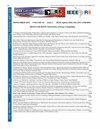Dynamic Phasor Modeling of the Single-Phase MMC under Modulation PSC-PWM
IF 1.3
4区 工程技术
Q3 COMPUTER SCIENCE, INFORMATION SYSTEMS
引用次数: 0
Abstract
This paper develops a model, based on the dynamic phasor approach, for the single-phase modular multilevel converter (MMC), where the switching sequences are generated by the phase-shifted carrier-based pulse-width modulation (PSC-PWM) scheme. The modeling process begins with the MMC state space model, from which the DC and the fundamental complex Fourier coefficients, called dynamic phasors, are extracted for both the original state variables and the switching functions. It is worth noting that, in the developed dynamic phasor-based model (DPhM) of the MMC, all capacitor voltages per phase are considered separately in the modeling process, which contrast with the usual definition of variables based on the sum and difference of the capacitor voltages on the arms. Experimental results are presented to demonstrate the validity of the MMC DPhM as compared to the response of the switched MMC under the PSC-PWM scheme. In particular, it is observed that the developed MMC DPhM is able to reproduce the steady-state waveforms of all original state variables, including the ripple amplitude, as compared to the results obtained with the switched MMC. Furthermore, it is shown that, both in the switched MMC under the PSC-PWM and in the derived DPhM MMC, all capacitors converge to the same steady-state average value without adding an external balance controller, but only due to the natural balancing action of the PSC-PWM scheme, despite arbitrary initial conditions of capacitor voltages.PSC-PWM调制下单相MMC的动态相量建模
本文建立了基于动态相量方法的单相模块化多电平转换器(MMC)模型,其中开关序列由基于相移载波的脉宽调制(PSC-PWM)方案产生。建模过程从MMC状态空间模型开始,从中提取原始状态变量和开关函数的DC和基本复傅立叶系数(称为动态相量)。值得注意的是,在所开发的MMC基于动态相量的模型(DPhM)中,在建模过程中单独考虑了各个电容的每相电压,这与通常根据臂上电容电压的和和差来定义变量不同。实验结果证明了MMC DPhM的有效性,并与开关MMC在PSC-PWM方案下的响应进行了比较。特别是,与开关MMC获得的结果相比,所开发的MMC DPhM能够再现所有原始状态变量的稳态波形,包括纹波幅度。此外,在PSC-PWM下的开关MMC和推导的DPhM MMC中,所有电容器都收敛到相同的稳态平均值,而无需添加外部平衡控制器,而仅仅是由于PSC-PWM方案的自然平衡作用,尽管电容电压的初始条件是任意的。
本文章由计算机程序翻译,如有差异,请以英文原文为准。
求助全文
约1分钟内获得全文
求助全文
来源期刊

IEEE Latin America Transactions
COMPUTER SCIENCE, INFORMATION SYSTEMS-ENGINEERING, ELECTRICAL & ELECTRONIC
CiteScore
3.50
自引率
7.70%
发文量
192
审稿时长
3-8 weeks
期刊介绍:
IEEE Latin America Transactions (IEEE LATAM) is an interdisciplinary journal focused on the dissemination of original and quality research papers / review articles in Spanish and Portuguese of emerging topics in three main areas: Computing, Electric Energy and Electronics. Some of the sub-areas of the journal are, but not limited to: Automatic control, communications, instrumentation, artificial intelligence, power and industrial electronics, fault diagnosis and detection, transportation electrification, internet of things, electrical machines, circuits and systems, biomedicine and biomedical / haptic applications, secure communications, robotics, sensors and actuators, computer networks, smart grids, among others.
 求助内容:
求助内容: 应助结果提醒方式:
应助结果提醒方式:


